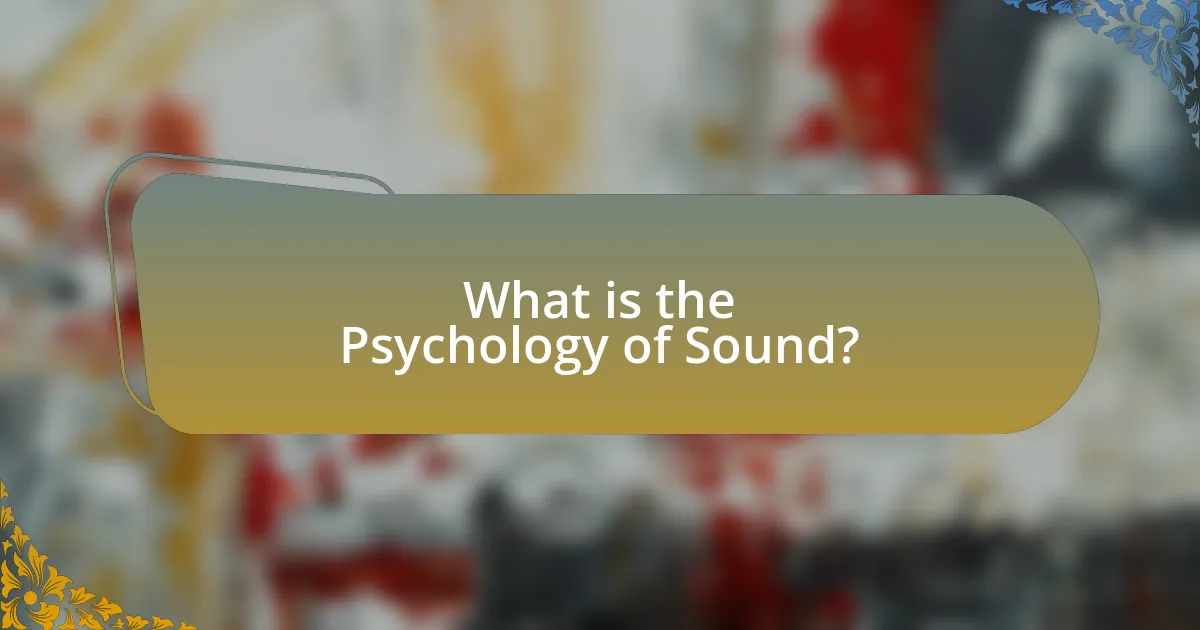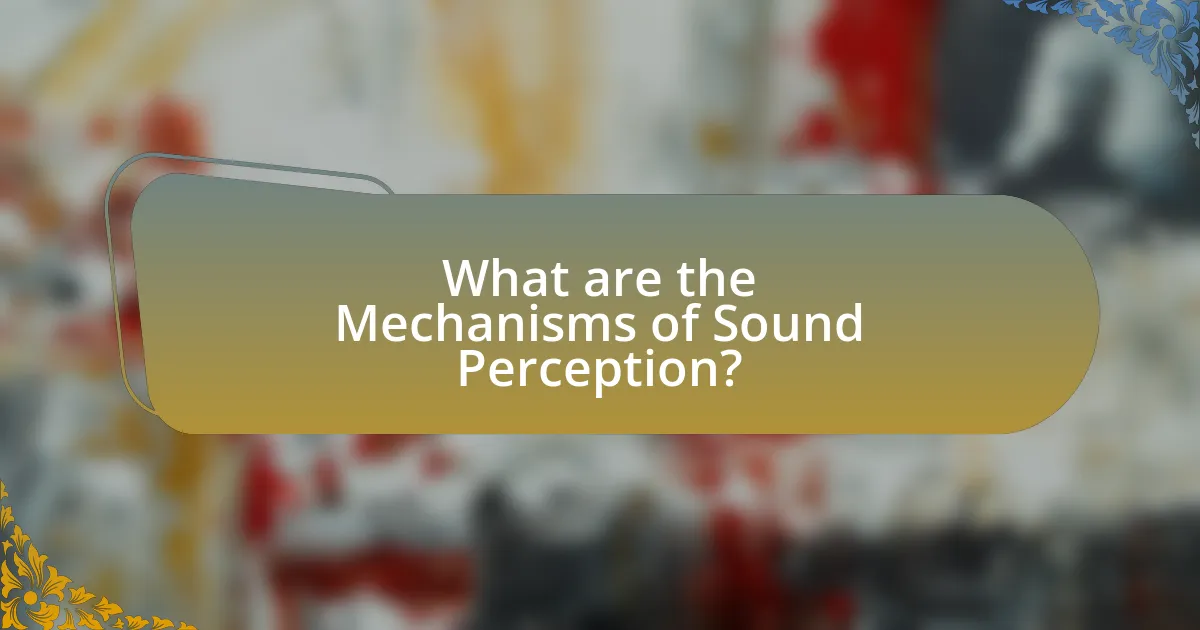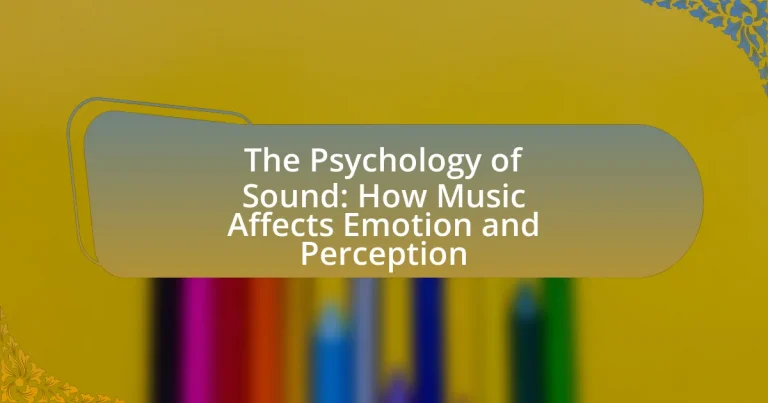The main entity of the article is the psychology of sound, which explores how auditory stimuli, particularly music, influence human emotions, behaviors, and perceptions. The article examines the emotional responses triggered by different musical elements, such as major and minor keys, and discusses the psychological mechanisms behind sound perception, including auditory processing and emotional response. It highlights the universal nature of music as a form of communication that transcends cultural barriers and the impact of sound on memory recall, decision-making, and emotional regulation. Additionally, the article addresses the therapeutic applications of music and the factors that shape individual differences in sound perception, emphasizing the significance of understanding sound psychology in enhancing daily experiences and improving mental health.

What is the Psychology of Sound?
The psychology of sound examines how auditory stimuli influence human emotions, behaviors, and perceptions. Research indicates that sound can evoke specific emotional responses; for instance, studies show that major chords often elicit feelings of happiness, while minor chords can induce sadness. Additionally, soundscapes, such as nature sounds or urban noise, significantly affect mood and cognitive performance, as demonstrated in experiments where participants exposed to pleasant sounds performed better on tasks than those in noisy environments. This field integrates principles from psychology, neuroscience, and acoustics to understand the complex relationship between sound and human experience.
How does sound influence human emotions?
Sound significantly influences human emotions by triggering physiological and psychological responses. Research indicates that different types of sounds, such as music or environmental noise, can evoke specific emotional states. For instance, studies show that major chords in music often elicit feelings of happiness, while minor chords can induce sadness. A study published in the journal “Emotion” by Juslin and Västfjäll (2008) found that music can evoke strong emotional responses due to its ability to convey meaning and context, impacting mood and emotional well-being. Additionally, sound can affect stress levels; for example, nature sounds have been shown to reduce anxiety and promote relaxation. Thus, the relationship between sound and emotion is well-documented, highlighting sound’s powerful role in shaping human emotional experiences.
What are the psychological mechanisms behind sound perception?
The psychological mechanisms behind sound perception involve auditory processing, attention, and emotional response. Auditory processing occurs in the brain, where sound waves are transformed into neural signals, allowing individuals to interpret pitch, volume, and timbre. Attention plays a crucial role, as it determines which sounds are prioritized for processing, influenced by factors such as relevance and familiarity. Emotional responses to sound are mediated by the limbic system, which links auditory stimuli to feelings and memories, demonstrating that sound can evoke strong emotional reactions. Research indicates that music can significantly alter mood and perception, as shown in studies like “The Effect of Music on Emotion: A Review” by Thoma et al. (2013), which highlights the connection between sound and emotional states.
How do different frequencies affect emotional responses?
Different frequencies significantly influence emotional responses by eliciting distinct feelings and physiological reactions. Research indicates that lower frequencies, such as bass sounds, often evoke feelings of calmness or sadness, while higher frequencies can induce excitement or anxiety. For instance, a study published in the Journal of Experimental Psychology found that music with a higher pitch can lead to increased arousal and positive emotions, while lower pitches are associated with negative emotions. This relationship between frequency and emotion is rooted in the brain’s processing of sound, where specific frequencies activate different neural pathways linked to emotional experiences.
Why is music considered a universal language?
Music is considered a universal language because it transcends cultural and linguistic barriers, allowing people from diverse backgrounds to connect emotionally and communicate shared experiences. Research indicates that music elicits similar emotional responses across different cultures, as demonstrated in a study published in the journal “Proceedings of the National Academy of Sciences,” where participants from various countries identified emotions in music with high accuracy, regardless of their cultural context. This ability to evoke feelings and convey meaning without the need for words reinforces music’s role as a powerful medium for human connection.
What cultural factors influence musical interpretation?
Cultural factors that influence musical interpretation include societal norms, historical context, and regional traditions. Societal norms dictate the emotional responses and meanings attributed to specific musical elements, such as rhythm and melody, which vary across cultures. Historical context shapes how music is perceived, as events and movements can imbue certain styles with significance; for example, the civil rights movement in the United States influenced the interpretation of jazz and blues. Regional traditions contribute to unique performance practices and stylistic nuances, as seen in the differences between Western classical music and Indian classical music, where improvisation plays a central role. These factors collectively shape how individuals interpret and engage with music, demonstrating the profound impact of culture on musical expression.
How does music transcend linguistic barriers?
Music transcends linguistic barriers by conveying emotions and meanings that are universally understood, regardless of language. The structure of music, including melody, rhythm, and harmony, evokes emotional responses that resonate across different cultures. For instance, studies have shown that certain musical elements can elicit similar emotional reactions in diverse populations, indicating that music communicates feelings more effectively than words. Research published in the journal “Nature” by Juslin and Västfjäll (2008) demonstrates that listeners from various cultural backgrounds can identify emotions in music, such as happiness or sadness, without needing to understand the lyrics. This ability to evoke shared emotional experiences allows music to connect people beyond their linguistic differences.
What role does sound play in shaping our perceptions?
Sound significantly influences our perceptions by affecting our emotions, attention, and cognitive processing. Research indicates that different sound frequencies and musical elements can evoke specific emotional responses; for instance, major chords often elicit feelings of happiness, while minor chords can induce sadness. A study published in the journal “Psychological Science” by researchers at the University of Groningen found that background music can alter the way individuals perceive visual stimuli, demonstrating that sound can shape not only emotional states but also cognitive interpretations of the environment. This interplay between sound and perception underscores the integral role that auditory experiences play in shaping our understanding and emotional reactions to the world around us.
How does background music affect decision-making?
Background music significantly influences decision-making by altering emotional states and cognitive processes. Research indicates that music can enhance mood, which in turn affects the choices individuals make; for instance, upbeat music often leads to more optimistic decision-making, while slower, melancholic tunes may result in more cautious or pessimistic choices. A study published in the Journal of Consumer Research by North, Hargreaves, and Hargreaves (2004) found that background music can affect consumer behavior, with participants exposed to classical music spending more on wine compared to those listening to pop music. This demonstrates that the type of background music can shape not only emotional responses but also the financial decisions made by individuals.
What is the impact of sound on memory recall?
Sound significantly impacts memory recall by enhancing or impairing the retrieval of information. Research indicates that specific auditory cues, such as music or environmental sounds, can trigger memories associated with those sounds, facilitating recall. For instance, a study published in the journal “Memory & Cognition” by Smith and Henson (2003) demonstrated that participants recalled information better when they were exposed to the same sound environment during both learning and recall phases. This phenomenon, known as context-dependent memory, illustrates how sound serves as a contextual cue that can improve memory retrieval.

How does Music Affect Emotion?
Music profoundly affects emotion by eliciting specific feelings and responses through its elements such as melody, harmony, and rhythm. Research indicates that music can trigger emotional reactions by activating brain regions associated with emotion regulation, such as the amygdala and prefrontal cortex. For instance, a study published in the journal “Nature Neuroscience” by Blood and Zatorre found that listening to pleasurable music releases dopamine, a neurotransmitter linked to feelings of pleasure and reward. Additionally, different musical genres can evoke distinct emotional states; for example, major keys often induce happiness, while minor keys can evoke sadness. This demonstrates that music serves as a powerful tool for emotional expression and regulation.
What are the emotional responses triggered by music?
Music triggers a wide range of emotional responses, including happiness, sadness, nostalgia, and excitement. Research indicates that specific musical elements, such as tempo, key, and harmony, significantly influence these emotions. For instance, fast tempos and major keys often evoke feelings of joy and energy, while slow tempos and minor keys can elicit sadness or introspection. A study published in the journal “Emotion” by Juslin and Västfjäll (2008) found that music can evoke strong emotional reactions due to its ability to activate brain regions associated with emotion, such as the amygdala. This demonstrates that music serves as a powerful medium for emotional expression and experience.
How do major and minor keys influence feelings?
Major keys typically evoke feelings of happiness and brightness, while minor keys are associated with sadness and melancholy. Research indicates that major chords and scales often produce positive emotional responses due to their harmonic structure, which is perceived as consonant and stable. In contrast, minor keys create a sense of tension and complexity, leading to feelings of introspection or sorrow. A study by Juslin and Laukka (2003) found that listeners consistently rated music in major keys as more joyful compared to music in minor keys, reinforcing the emotional impact of these tonalities.
What role do lyrics play in emotional engagement?
Lyrics play a crucial role in emotional engagement by conveying narratives and sentiments that resonate with listeners. They serve as a medium through which emotions are expressed, allowing individuals to connect personally with the music. Research indicates that lyrics can evoke specific emotional responses; for example, a study published in the Journal of Personality and Social Psychology found that lyrics reflecting personal experiences can enhance feelings of empathy and identification with the artist. This connection is further supported by the fact that lyrics often encapsulate universal themes of love, loss, and struggle, making them relatable across diverse audiences. Thus, the emotional impact of music is significantly amplified by the presence of meaningful lyrics.
Why do certain songs evoke nostalgia?
Certain songs evoke nostalgia because they trigger emotional memories associated with specific times, places, or experiences in a listener’s life. This phenomenon occurs due to the brain’s ability to link music with personal memories, facilitated by the hippocampus, which is involved in memory formation, and the amygdala, which processes emotions. Research indicates that familiar melodies can activate neural pathways related to past experiences, making listeners feel a sense of longing or reminiscence. For instance, a study published in the journal “Psychology of Music” by Janata et al. (2007) found that participants reported stronger emotional responses and vivid memories when listening to songs from their adolescence compared to unfamiliar music.
How does personal experience shape musical nostalgia?
Personal experience significantly shapes musical nostalgia by creating emotional connections to specific songs or genres tied to memories. When individuals encounter music that resonates with their past experiences, such as significant life events or relationships, it triggers a sense of nostalgia, often evoking feelings of longing or happiness. Research indicates that music can serve as a powerful cue for autobiographical memories, with studies showing that familiar songs can elicit vivid recollections of personal experiences, enhancing emotional responses. For instance, a study published in the journal “Memory & Cognition” by Janata et al. (2007) found that participants reported stronger emotional reactions to music that was associated with personal memories compared to unfamiliar music. This demonstrates how personal experiences not only influence the selection of music but also amplify the nostalgic feelings associated with it.
What is the science behind music-induced memories?
Music-induced memories occur due to the brain’s intricate processing of auditory stimuli, which activates specific neural pathways associated with memory retrieval. Research indicates that music engages the hippocampus, a region crucial for forming and recalling memories, while also stimulating the amygdala, which processes emotions. This dual activation enhances the emotional context of memories, making them more vivid and easier to recall. A study published in the journal “Neuroscience & Biobehavioral Reviews” by Janata et al. (2007) demonstrated that familiar songs can evoke autobiographical memories, highlighting the strong link between music and personal experiences.
How can music be used therapeutically?
Music can be used therapeutically by facilitating emotional expression, reducing anxiety, and enhancing cognitive function. Research indicates that music therapy can significantly lower stress levels and improve mood, as evidenced by a study published in the Journal of Music Therapy, which found that participants experienced a 50% reduction in anxiety after engaging in music therapy sessions. Additionally, music has been shown to aid in pain management and rehabilitation, with studies demonstrating that patients recovering from surgery reported lower pain levels when exposed to music. Thus, music serves as a powerful tool in therapeutic settings, promoting mental and emotional well-being.
What are the benefits of music therapy for mental health?
Music therapy offers significant benefits for mental health, including reduced anxiety, improved mood, and enhanced emotional expression. Research indicates that engaging with music can lower cortisol levels, which are associated with stress, thereby promoting relaxation and emotional well-being. A study published in the Journal of Music Therapy found that participants who underwent music therapy reported a 50% reduction in anxiety symptoms. Additionally, music therapy facilitates communication and social interaction, particularly for individuals with conditions such as autism or dementia, enhancing their overall quality of life.
How does music therapy aid in emotional regulation?
Music therapy aids in emotional regulation by providing individuals with a structured way to express and process their emotions through musical engagement. This therapeutic approach utilizes music to evoke emotional responses, facilitating the exploration of feelings in a safe environment. Research indicates that music therapy can reduce anxiety and depression, enhance mood, and improve emotional awareness, as evidenced by a meta-analysis published in the Journal of Music Therapy, which found that music therapy significantly decreased anxiety levels in various populations. Additionally, the rhythmic and melodic elements of music can activate brain regions associated with emotion regulation, such as the amygdala and prefrontal cortex, further supporting its effectiveness in managing emotional states.

What are the Mechanisms of Sound Perception?
The mechanisms of sound perception involve the auditory system’s ability to detect, process, and interpret sound waves. Sound waves enter the ear, where they cause the eardrum to vibrate; these vibrations are transmitted through the ossicles to the cochlea, which converts them into neural signals. The auditory nerve then carries these signals to the brain, where they are processed in the auditory cortex, allowing for the recognition of pitch, volume, and timbre. Research indicates that the brain’s interpretation of sound is influenced by both physiological factors, such as the structure of the ear, and psychological factors, including prior experiences and emotional context, which can affect how music is perceived and its emotional impact.
How do our brains process sound?
Our brains process sound through a series of complex steps involving the auditory system. Sound waves enter the ear, causing the eardrum to vibrate, which then transmits these vibrations through the ossicles to the cochlea in the inner ear. The cochlea converts these mechanical vibrations into electrical signals, which are sent via the auditory nerve to the auditory cortex in the brain.
In the auditory cortex, the brain interprets these signals, allowing us to perceive pitch, volume, and timbre. Research indicates that the brain’s ability to process sound is not only crucial for communication but also plays a significant role in emotional responses to music, as evidenced by studies showing that specific musical elements can evoke distinct emotional reactions.
What are the stages of auditory processing?
The stages of auditory processing include sound detection, sound discrimination, sound identification, and sound comprehension. Sound detection involves the initial perception of sound waves by the auditory system. Sound discrimination refers to the ability to differentiate between different sounds, such as pitch and volume. Sound identification is the recognition of specific sounds, such as identifying a musical note or a spoken word. Finally, sound comprehension involves understanding the meaning of the sounds, including the emotional context conveyed by music or speech. These stages are essential for effective communication and emotional response to auditory stimuli.
How does sound localization work in the brain?
Sound localization in the brain involves the ability to identify the origin of a sound in the environment. This process primarily relies on the integration of auditory information from both ears, utilizing differences in sound intensity and timing to determine direction. The brain’s auditory cortex, along with structures such as the superior olivary complex and the inferior colliculus, plays a crucial role in processing these auditory cues. Research indicates that the brain can detect interaural time differences as small as 10 microseconds, allowing for precise localization of sounds in space.
What factors influence individual differences in sound perception?
Individual differences in sound perception are influenced by factors such as genetics, age, cultural background, and personal experiences. Genetic variations can affect auditory processing abilities, leading to differences in how sounds are perceived. Age-related changes in hearing sensitivity can also alter sound perception, with older individuals often experiencing diminished high-frequency hearing. Cultural background plays a significant role, as exposure to different musical styles and sound environments shapes auditory preferences and interpretations. Additionally, personal experiences, including emotional associations with specific sounds or music, further contribute to the uniqueness of sound perception among individuals. These factors collectively demonstrate the complexity of how sound is experienced and interpreted on a personal level.
How do age and hearing ability affect sound perception?
Age and hearing ability significantly influence sound perception, with older individuals often experiencing diminished auditory sensitivity and frequency discrimination. Research indicates that age-related hearing loss, known as presbycusis, affects the ability to perceive higher frequencies, which can alter the perception of music and speech. A study published in the Journal of the Acoustical Society of America found that individuals over 60 years old showed a marked decline in their ability to detect sounds above 2000 Hz, impacting their overall auditory experience. Additionally, those with hearing impairments may struggle to distinguish between similar sounds, leading to challenges in understanding speech and enjoying music. This decline in auditory processing can affect emotional responses to sound, as individuals may miss nuances in music that evoke specific feelings.
What role does cultural background play in sound interpretation?
Cultural background significantly influences sound interpretation by shaping individuals’ perceptions, preferences, and emotional responses to music and sounds. For instance, research indicates that people from different cultures may interpret the same musical notes or rhythms differently based on their cultural experiences and exposure. A study by North and Hargreaves (2008) found that individuals from Western cultures tend to associate major chords with happiness and minor chords with sadness, while other cultures may have different associations. This demonstrates that cultural context not only affects the emotional interpretation of sound but also the cognitive processing of musical elements, leading to varied experiences across different cultural groups.
How can understanding sound perception improve our lives?
Understanding sound perception can significantly enhance our lives by improving communication, emotional well-being, and cognitive function. Research indicates that sound perception influences how we interpret social cues and emotional expressions, which can lead to better interpersonal relationships. For instance, a study published in the journal “Psychological Science” found that individuals who are more attuned to subtle auditory cues are better at recognizing emotions in others, thereby fostering empathy and social cohesion. Additionally, sound perception plays a crucial role in cognitive tasks; environments with optimal soundscapes can enhance focus and productivity. A study from the University of California demonstrated that background music can improve performance on tasks requiring concentration, highlighting the practical benefits of understanding how sound affects our mental processes. Thus, by leveraging insights from sound perception, individuals can enhance their social interactions and cognitive abilities, leading to a more fulfilling life.
What practical applications can be derived from sound psychology?
Practical applications derived from sound psychology include therapeutic uses in music therapy, enhancing learning environments, and improving marketing strategies. Music therapy utilizes sound to promote emotional healing and cognitive development, as evidenced by studies showing its effectiveness in reducing anxiety and improving mood in clinical settings. Additionally, sound psychology informs the design of educational spaces, where background music can enhance concentration and retention, supported by research indicating that certain types of music can boost cognitive performance. In marketing, understanding how sound influences consumer behavior allows businesses to create more engaging advertisements, with studies revealing that music can significantly affect purchasing decisions and brand perception.
How can we use music to enhance our daily experiences?
Music can enhance daily experiences by influencing mood, improving focus, and fostering social connections. Research indicates that listening to music can elevate serotonin levels, which contributes to feelings of happiness and well-being. For instance, a study published in the journal “Psychological Science” found that participants who listened to upbeat music reported higher levels of happiness compared to those who did not. Additionally, music can improve concentration; a study in “The Journal of the Acoustical Society of America” demonstrated that background music can enhance cognitive performance in tasks requiring attention. Furthermore, music serves as a social bonding tool, as evidenced by a study in “Music Perception,” which showed that shared musical experiences can strengthen interpersonal relationships. Thus, integrating music into daily routines can significantly enhance emotional states, productivity, and social interactions.


